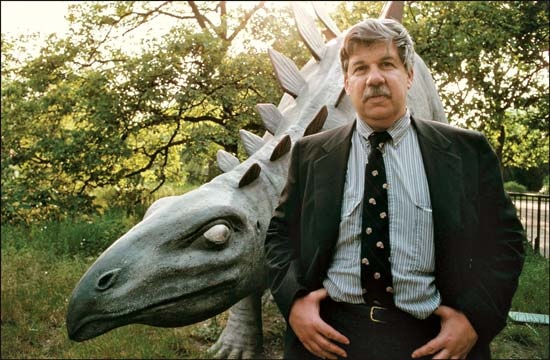Gould, Stephen Jay
American paleontologist
born September 10, 1941, New York, New York, U.S.
died May 20, 2002, New York
 American paleontologist, evolutionary biologist, and science writer.
American paleontologist, evolutionary biologist, and science writer.Gould graduated from Antioch College in 1963 and received a Ph.D. in paleontology at Columbia University in 1967. He joined the faculty of Harvard University in 1967, becoming a full professor there in 1973. Gould's own technical research focused on the evolution and speciation of West Indian land snails. With Niles Eldredge, he developed in 1972 the theory of punctuated equilibrium, a revision of Darwinian theory proposing that the creation of new species through evolutionary change occurs not at slow, constant rates over millions of years but rather in rapid bursts over periods as short as thousands of years, which are then followed by long periods of stability during which organisms undergo little further change. Gould's theory, as well as much of his later work, often drew criticism from other scientists.
Apart from his technical research, Gould became widely known as a writer, polemicist, and popularizer of evolutionary theory. In his books Ontogeny and Phylogeny (1977), The Mismeasure of Man (1981), Time's Arrow, Time's Cycle (1987), and Wonderful Life (1989), he traced the course and significance of various controversies in the history of evolutionary biology, intelligence testing, geology, and paleontology. From 1974 Gould regularly contributed essays to the periodical Natural History, and these were collected in several volumes, including Ever Since Darwin (1977), The Panda's Thumb (1980), and Hen's Teeth and Horse's Toes (1983). His science writing is characterized by a graceful literary style and the ability to treat complex concepts with absolute clarity.
- saturniid moth
- Saturninus, Lucius Appuleius
- satyagraha
- Satyajit Ray
- Satyasiddhi-śāstra
- Satyendra Nath Bose
- Satyendra Prassano, 1st Baron Sinha of Raipur Sinha
- Satyendra Prassano Sinha, 1st Baron Sinha of Raipur
- Satyr and Silenus
- satyr butterfly
- Satyricon
- satyr play
- Satō Eisaku
- Satō Haruo
- Satō Nobuhiro
- Saubel, Katherine Siva
- sauce
- sauceboat
- Saucesian Stage
- Sauckel, Fritz
- saudade
- Saudi Arabia
- Saudi Arabia, flag of
- sauerbraten
- Sauer, Carl O